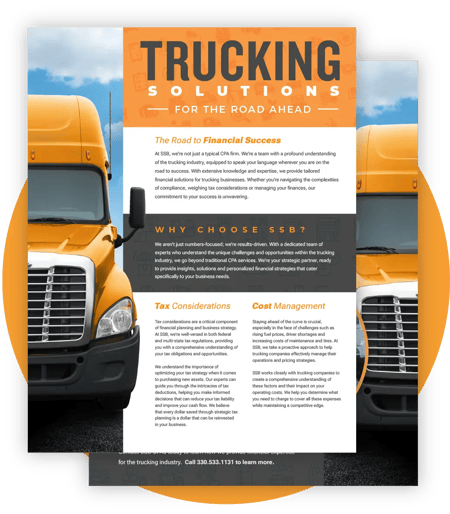8 min read
How LTC Insurance Can Help Manage Senior Care Costs
Approximately 70% of adults who survive to age 65 will need long-term care services, and 48% will receive some paid...

In today’s economic environment, there are many factors that impact the profitability of the trucking industry. Rising fuel prices, driver turnover, increased liability risks, increased borrowing costs are just a few of the complex issues that face both family-owned businesses and multimillion-dollar operations. Sound advice and strategic planning are essential to achieve profitability.

SSB recognizes that federal and multistate tax issues are a major concern of the trucking industry and stays on top of the ever-changing tax laws. We understand that each state considers different factors in determining whether a trucking company has nexus in the state.
Our team of strategic advisors will help you plan for business growth, cash flow needs and tax liabilities—a plan to keep you on the road to financial success and profitability in today’s constantly changing business environment.
Cash flow analysis
Recommendations to improve working capital to help increase financing capacities
Preparation of budgets and projections
Preparation of financial statements according to present industry standards
Coordination of business and personal tax planning
Multistate issues—nexus, sales and use tax, franchise, income and other taxes
Structuring of business entities
Independent contractor issues
Business continuation/succession planning
Analysis of potential acquisitions and mergers
Estate planning

91.5% of trucking carriers in the U.S. operate with six or fewer trucks.
In addition, 97.4% operate with fewer than 20 trucks, indicating that the vast majority of U.S. trucking carriers aren’t owned by large companies. Our team of strategic advisors will help you develop a plan to keep you on the road to financial success and profitability in today’s constantly changing business environment.
Our team of strategic advisors will help you develop a plan to keep you on the road to financial success and profitability in today’s constantly changing business environment.


Keeping track of all the changes in the tax code can be a nuisance and knowing how and when to apply for write-offs is more difficult than it may seem. With truckers filing taxes every quarter, trucking CPAs can help simplify the process and take advantage of any trucker-specific tax deductions.
Owners have enough paperwork to deal with. And truckers have even more. By collecting your financial paperwork and handing it over to the professionals, you can focus more on your business. CPAs will do all of the sorting, aggregating and reporting for you.
Trucking industry specialists can handle all your bookkeeping needs from payroll to financial statements to tax prep/execution and more. Trucking CPAs are also helpful in monitoring regulatory compliance to make your life easier.
If there is a way your business could be saving money, a CPA can help you find it. With the exception of fixed costs, overhead costs can almost always be reduced. It is our job to make sure that the numbers are correct, so you don’t have to risk costly financial mistakes.
When running a fleet, smaller expenses could potentially be overlooked. For example, when reimbursement forms are filled out, you might not notice discrepancies in fuel rates. But with the help of a CPA, you can receive an in-depth analysis to make sure you aren’t dealing with fuel theft. SSB CPAs can also look at your balance sheet and make sure you’re not incorrectly writing things off.
There is a lot of information to track in order to make sure you comply with the tax laws impacting your operation. Since you’re always out on the road, you might not have time to follow up on these requirements. In addition, as tax laws change, it’s pivotal to make sure those changes are noted in your recordkeeping and reporting.
Because of the intricacies of this niche industry, it is crucial to work with accountants who have many years of experience in trucking.” Add “SSB is well-versed in the trucking industry. We have helped our trucking clients grow their businesses and grow through their succession plans.
Our CPAs can provide many accounting services to trucking companies, including financial services, tax services and wealth-building services.
These services include, but are not limited to:
8 min read
Jul 2, 2025
Approximately 70% of adults who survive to age 65 will need long-term care services, and 48% will receive some paid...
6 min read
Jun 25, 2025
Choosing the right business entity is one of the most important decisions entrepreneurs make when launching or...